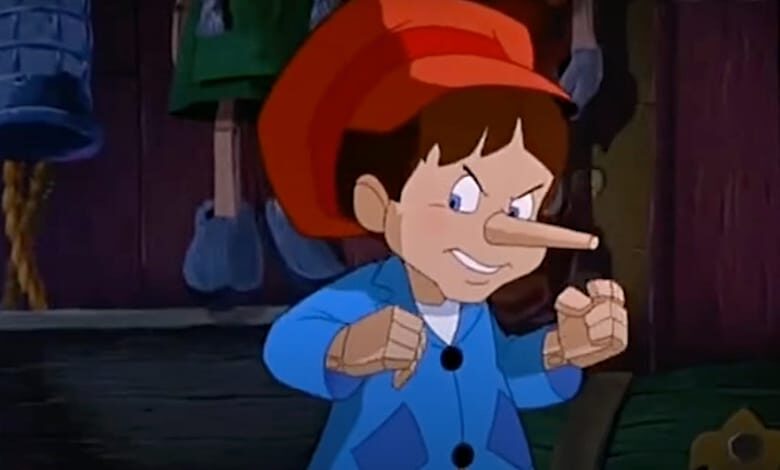
Among the strangest animated films of the 1980s, and one of the unlikeliest of sequels, is “Pinocchio and the Emperor of the Night,” a product courtesy of Filmation.
Any child of the ‘80s worth their Mr. T cereal knows the Filmation logo and their extensive output during the decade, most notably producing “He-Man and the Masters of the Universe” and “She-Ra: Princess of Power” (1985-1987).
Filmation gave a theatrical release to “He-Man and She-Ra: The Secret of the Sword” (1985), which was really a combo of televised episodes (in the same way “The Looney Looney Looney Bugs Bunny Movie” and “Go-Bots: Battle of the Rock Lords” are televised episodes fused together).
Directed by Hal Sutherland, the 1987 “Emperor of the Night” is a weird affair from top to bottom. When a bee wearing aviator goggles is the least strange thing here, you know what you’re in for.
At least the animation is at the upper end of the Saturday morning cartoon spectrum. It’s ambitious and well-paced, though always lacking the depth and beauty of Disney.
When we reacquaint ourselves with the main character, Pinocchio has been a real boy for a whole year.
Pinocchio is entranced by a magical carnival right out of Ray Bradbury’s “Something Wicked This Way Comes,” which changes him back into a puppet. The carnival’s Emperor (James Earl Jones) gets his power from our temptations; the character is clearly the equivalent of Mr. Dark and is, by far, the film’s biggest highlight.
There’s a lot of silliness and nonsense. To put it mildly, the original “Pinocchio” is better and darker. While the sequel offers some surreal and creepy imagery and some not-bad songs, it’s all too cheerful.
Of the voice cast, Ricky Lee Jones is The Good Fairy, Scott Grimes of “Critters,” “Party of Five” and “The Orville” plays Pinocchio and Tom Bosley of “Happy Days” and Glad garbage bag commercials is Gepetto. There’s also Ed Asner and Don Knotts as a Jiminy Crickett stand-in.
Jones’ voice cuts deeply, as always, and provides this with a much-needed dramatic weight. Note the way Jones makes even this line sound golden: “not even the Good Fairy will be able to save you!”
Pinocchio and the Emperor of the Night
Year: 1987
Cast: @ScottGrimes, Tom Bosley, Jonathan Harris, @TheOnlyEdAsner, Frank Welker, Don Knotts, James Earl Jones, Linda Gray, William Windom
Interesting voice cast, yet Filmation’s take on Pinocchio hurts my brain.@CursedAni pic.twitter.com/jsdliO6dH1— The Voice Artist’s Spotlight (@vas_90s) September 18, 2021
The Fairy Godmother later counters with, “Freedom of choice is your greatest power!” At another point, Pinocchio uses his nose as a weapon by either lying or telling the truth.
“Pinocchio and the Emperor of the Night” isn’t great, but it is fascinating, released during that moment when Don Bluth and Will Vinton were trailblazers and Disney’s animated output had seemingly peaked (the following years would put them back on top).
This was released the same year as “The Chipmunk Adventure.” Truth be told, “The Care Bears Movie” (1985) is actually edgier than this.
Disney famously lost in its attempt to block the release of this film, due to the character being in public domain.
The 1980s was the final decade where the studio would have a casual attitude towards its creative property. For example: the climax of “Gremlins” (1984) features extensive use of “Snow White and the Seven Dwarfs” and the dream sequence in “Fletch Lives” (1989) parodies “Song of the South.”
Those elaborate sequences would never occur today.
RELATED: WHY ’80s ‘GREAT MOUSE DETECTIVE’ SAVED DISNEY
“Pinocchio and the Emperor of the Night” would also represent one of the last attempts for its studio at releasing theatrical fare: Aside from “He-Man and She-Ra: The Secret of the Sword,” the only other theatrical release from Filmation was “Happily Ever After.”
On the other hand, Pinocchio is actually having a busy 2022, despite how the character seemed to have taken a nose dive with the clumsy, live-action “The Adventures of Pinocchio” (1996).
We’ve already seen the widely unloved live-action Disney remake from Robert Zemeckis and the forthcoming Guillermo Del Toro version premieres Dec. 9 on Netflix.
What is it about Pinocchio that resonates today?
Perhaps the themes of what it means to be truly human or having a concentrated effort at maintaining a childlike view of the world.
In other words, Pinocchio is a snug fit for our current obsession with nostalgia. His return comes on the heels of Pete “Maverick” Mitchell’s box office reunion and the recent “Ghostbusters: Afterlife” revival.
In the same vein of ’80s-centric movie retrospectives, “Pinocchio and the Emperor of the Night,” while far more arcane than the likes of “The Little Mermaid” and “The Monster Squad,” is in good company.
In this age of looking backward, dusting off that E.T. doll and embracing the stranger things in our childhoods, who is more apt a metaphor for our collective unwillingness to grow up than a boy who was once a toy himself and has the slivers to prove it?
